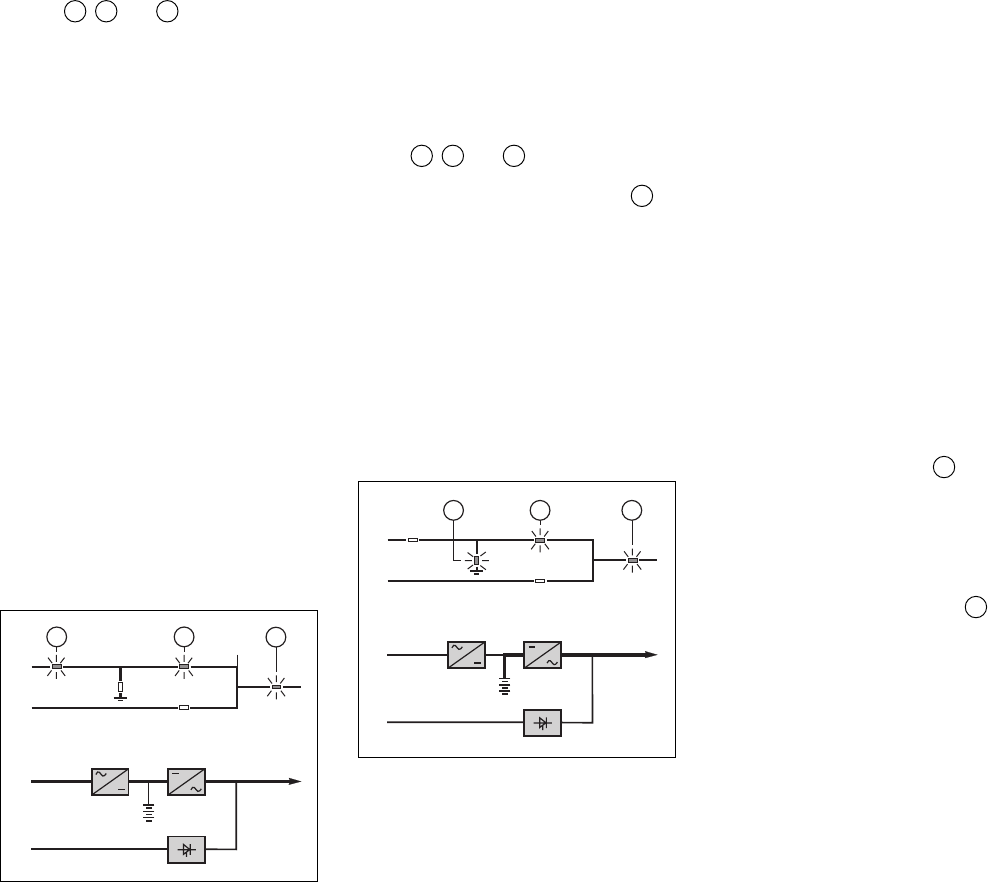
8 - E-51028230XT/BG
Introduction (cont.)
Operation in on-line
mode
Normal operation
Normal AC source power is available
(see figure 7).
◗ lights 1 , 4 and 5 shine green on
the control panel;
◗ the power necessary for the load is
provided by the normal AC source (1)
through the rectifier/charger (A) and the
inverter (B);
◗ the rectifier/charger (A) also supplies
the power to float charge and recharge
the battery if any.
The rectifier/charger output voltage
(DC) is regulated to supply:
◗◗ the float-charging or the recharging
voltage for vented lead-acid or Ni/Cd
batteries,
◗ ◗ a single charge voltage for sealed
lead-acid batteries.
The voltages depend on the number of
battery cells and the battery
manufacturer. Factory set, they may
also be adjusted by after-sales support
technicians.
An electronic board continuously
measures the battery temperature and
automatically adjusts the voltages.
Note:
In parallel MGE™ Galaxy™ PW
systems, the power drawn by the load
is equally shared between the different
units.
Operation with the normal
AC source down
See figure 8.
In the event of a normal AC source
failure or voltage outside specified
tolerances of ±10% in amplitude (±15%
optionally), the rectifier/charger (A)
stops and the battery (D) supplies the
necessary backup power to the load via
the inverter (B). The battery, float-
connected between the rectifier/charger
and the inverter, discharges during this
operating mode.
Lights
2 , 4 and 5 shine green.
The user is warned of battery operation
by the slow beeping of the buzzer
6
(see figure 19) and the message
"LOAD PROTECTED, BATTERY
DISCHARGING", followed by the
remaining backup time and the percent
load.
This information is also available via
volt-free changeover contacts for
remote control devices.
Note:
In the event of a normal AC source
failure, frequency converters without a
battery shut down and the load is no
longer supplied.
Battery time
The available battery time during a
normal AC source outage depends on
the:
◗ rated capacity of the battery;
◗ power consumed by the load;
◗ temperature of the battery;
◗ age of the battery.
The specified battery time corresponds
to a minimum duration at full rated load.
The actual backup time can therefore
be greater if the system operates below
its full rated load during the normal AC
source outage. Operation on battery
power can be extended beyond the
specified time by reducing the load
power consumption (by disconnecting
non-critical loads).
A "low battery" warning signal is sent
via volt-free changeover contacts for
remote control devices when the
battery voltage reaches a level slightly
above the minimum level. This signal
warns the user of the imminent end of
battery power. On the device itself, the
buzzer beeps rapidly.
The message "LOW-BATTERY
SHUTDOWN WARNING" is displayed,
followed by the remaining backup time
and the percent load. Light
2 turns red
and flashes.
Battery power stops when the voltage
supplied by the battery reaches the
minimum threshold (335 V). This
results in inverter shutdown and
transfer of the load without interruption
to the bypass AC source. Light
2
shines red (not flashing). The message
"LOAD NOT PROTECTED, ON-LINE
MODE" is displayed and the buzzer
sounds continuously.
If the bypass AC source also fails, the
load is no longer supplied. The inverter
automatically shuts down when the
time on battery power exceeds three
times the specified backup time.
Note:
The "low battery shutdown" warning
signal can be sent with an adjustable
time delay prior to the effective end of
battery power.
Fig. 7
1
2
AB
C
D
2
1
4
5
1
Fig. 8
2
1
4 52
1
2
AB
C
D


















